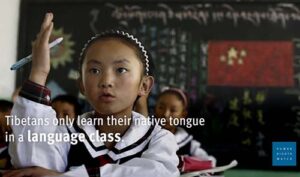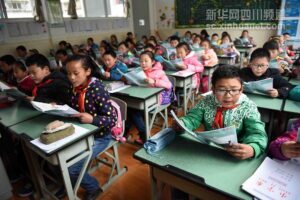 Chinese is replacing Tibetan as the language of instruction in Tibetan primary schools under China’s bilingual education policy, denying Tibetan children access to education in their mother tongue according to a report released by Human Rights Watch (HRW).
Chinese is replacing Tibetan as the language of instruction in Tibetan primary schools under China’s bilingual education policy, denying Tibetan children access to education in their mother tongue according to a report released by Human Rights Watch (HRW).
In its report, China’s Bilingual Education’ Policy in Tibet: Tibetan-Medium Schooling Under Threat, HRW says Chinese has been the language of instruction used in Tibetan middle schools and high schools since China annexed Tibet in 1959. However, kindergartens and elementary schools in the Tibetan Autonomous Region have continued teaching students in Tibetan.
The report points to the Chinese constitution which guarantees minority language rights. Many Tibetans consider the preservation of their language as integral to their survival as a distinct people within China.
According to HRW, the communist regime considers the promotion of the Tibetan language as “separatist activity” and has conducted a decade long programme to phase out Tibetan from schools. In 2010 China introduced bilingual education programmes in schools throughout the country with two models: model 1 emphasises instruction in the local minority language while model 2 emphasises instruction in Chinese.
Upon implementation of the programme in the Tibet Autonomous Region, authorities did not specify which model was to be employed. According to HRW, schools have been under pressure to use model 2 and focus on instruction in Chinese.
 The report details tactics HRW says the government uses to force Tibetan schools to use Chinese as the dominate language, including hiring non-Tibetan speaking teachers and closing rural schools forcing students to board in urban areas away from their Tibetan speaking families.
The report details tactics HRW says the government uses to force Tibetan schools to use Chinese as the dominate language, including hiring non-Tibetan speaking teachers and closing rural schools forcing students to board in urban areas away from their Tibetan speaking families.
The International Campaign for Tibet says the bilingual education policy is part of the Chinese Communist Party’s policy of assimilation which pressures minorities to identify with Chinese culture. HRW notes a 2014 report by Chinese scholar Yao Jijun who said that integrating the Chinese language at the kindergarten level is a means of eliminating political unrest in the Tibetan regions.
According to HRW the policy of assimilation also promotes the indoctrination of minority children in Communist Party beliefs and political objectives.
The report notes that China’s bilingual education policies violate international laws, including the United Nations Convention on the Rights of the Child and the International Covenant on Civil and Political Rights.




 Print
Print Email
Email